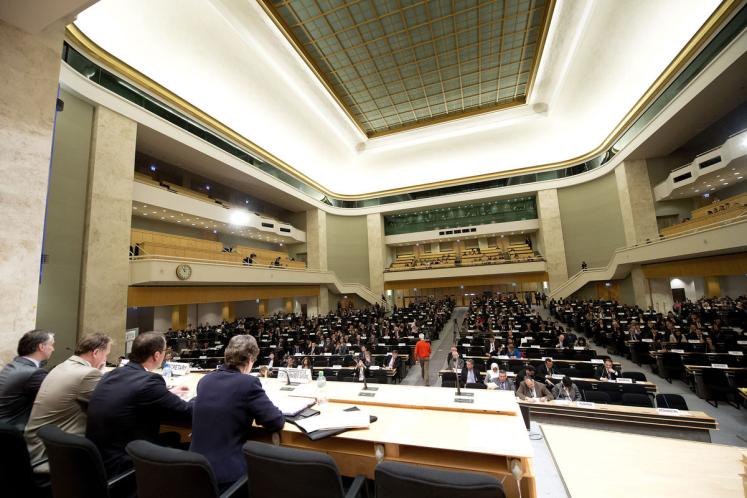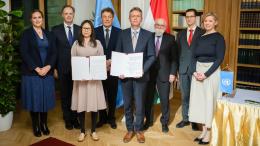In May 2010, 189 United Nations member-states gathered in New York for the eighth Review Conference of the Nuclear Non-Proliferation Treaty (NPT). By almost all accounts, the month-long conference was heralded as a success. States parties came to unanimous agreement on a final declaration that reaffirmed their obligations and commitments to the principles of the treaty, which is aimed at preventing the spread of nuclear weapons without hindering access to peaceful nuclear technologies. The declaration also included an unprecedented 64-point plan for follow-up action, centered on its so-called ‘three pillars’: non-proliferation, disarmament, and peaceful uses of nuclear energy. In addition, it called for the prompt implementation of the 1995 Review Conference’s Resolution on the Middle East, which would create a WMD-free zone in the region.
In a few months, member states will once again assess the treaty’s operation at the ninth NPT Review Conference – taking place in New York from April 27 to May 22, 2015. However, the air of optimism that followed the 2010 conference has all but dissipated, and the prospects for a similarly successful outcome already appear bleak. While there has been some movement in accordance with the Action Plan, overall implementation of the 64-point plan is lacking. A couple of NGO assessments argue that “progress since 2010 has been very limited” and “disappointing,” to the degree of “seriously threatening the confidence placed in the NPT.”
The three Preparatory Committees sessions convened since the last Review Conference have revealed a fundamental disconnect between the five recognized nuclear weapon states (the United States, Russia, the United Kingdom, France, and China) and the non-nuclear weapon states, especially on the issue of disarmament progress. The latter group points to the perpetuation of nuclear-based security doctrines and ongoing modernization plans of nuclear arsenals, arguing that the principles of transparency, irreversibility, and verifiability from the 2010 Action Plan have not been fulfilled. Ambassador Pedro Motta Pinto Coelho of Brazil declared simply that the five nuclear weapon states “had failed to comply with their obligations.”
While the issue of disarmament has long been a thorn for the NPT, its divisiveness seems to have reached new heights. A number of other factors also portend a contentious 2015 conference. Parties were unable to convene a conference to discuss a Middle East zone free of nuclear weapons and other weapons of mass destruction by 2012 (or since), as mandated. Negotiations in the Conference on Disarmament towards a verifiable treaty prohibiting the production of fissile materials for nuclear explosives remain stalled, despite a directive in place since 1995. The 1996 Comprehensive Test Ban Treaty’s entering into force has been blocked by the failure of the US, China, and six other nuclear-capable states to ratify the treaty. Meanwhile, current tensions between Russia and the West over Ukraine threaten to undermine the overall nuclear governance structure; for instance, Russia recently announced that it would not attend the 2016 Nuclear Security Summit.
The Nuclear Non-Proliferation Treaty and its associated International Atomic Energy Agency (IAEA) safeguards system stand as the core components of the global non-proliferation regime. Indefinitely extended in 1995, the NPT is one of the most widely-adhered to security arrangements at the international level. It appears to be in no serious danger of collapse. Still, the regime faces a myriad of challenges. Prolonged stand-offs with North Korea and Iran highlight limitations in its enforcement capabilities. Controversial civil nuclear cooperation deals with India and Pakistan underscore the dilemma of how to engage non-parties without undermining the treaty. Widespread resentment over asymmetric obligations threatens to hinder efforts to strengthen non-proliferation. A failed 2015 Review Conference could have disastrous consequences. It could erode the treaty’s credibility, push relations between its two groups to the breaking point, and jeopardize progress across the treaty’s three pillars.
To prevent this outcome, much work is required. The US, UK, and Russia can address a key point of contention by convening the postponed Helsinki Conference on the WMD-free zone in the Middle East. While this seems unlikely to take place before the Review Conference, any concrete progress towards the implementation of the 1995 resolution is critical. Meanwhile, the five recognized nuclear weapon states will have to demonstrate their commitment to the 2010 Action Plan, especially on the disarmament issue. The fact that the US and UK attended the recent Vienna Conference on the Humanitarian Impact of Nuclear Weapons suggests the possibility for constructive dialogue moving forward. Further steps in this vein might ensure a positive outcome in May.
Suggested citation: Wilfred Wan., "Towards the 2015 NPT Review Conference," UNU-CPR (blog), 2015-02-03, https://unu.edu/cpr/blog-post/towards-2015-npt-review-conference.



